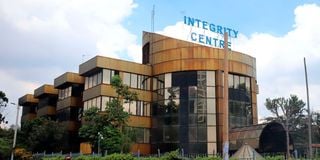Bribery, bias plague health tender awards in counties

Integrity Centre that hosts Ethics and Anti-Corruption Commission offices in Nairobi.
Tender awards for at least three out of 10 health projects at the county level were influenced by governors, a report by the anti-corruption agency has said.
They were followed closely by members of the county assembly (26 per cent) and Members of Parliament at 12 per cent. The report by the Ethics and Anti-Corruption Commission (EACC) examined the three phases of procurement, namely pre-tender, tender and post-tender.
Similarly, 13 per cent of contractors acknowledged cases of undue influence, as did 22 per cent of members of the public.
Wajir, Embu and Machakos had the highest levels of undue influence at 33 per cent, 30 per cent and 24 per cent respectively, while Makueni, Kisii and Narok had the lowest levels with zero influence, two per cent and 2.5 per cent respectively.
Also Read: Kemsa paid firms Sh870m in a rush
“This means in all health projects that were handled in Makueni, none was done under the influence, while the majority in Wajir was influenced by external forces,” says Mr Vincent Ongoko, the director, Preventive Services at EACC, adding that high-level people influence and interfere with procurement.
Bribery was identified as one of the major forms of corruption, with those paying in cash at 70 per cent, and wireless money transfer and favours at two per cent each. The average bribe paid for healthcare projects was Sh395, 909. The highest amount paid was Sh3,000,000 and the lowest was Sh5,000. Others paid 10 per cent of the project value.
The respondents also identified favouritism at 21 per cent, conflict of interest at 20 per cent and bribery at 16 per cent as forms of corruption at the initiation stage, while manipulating costs was at 21 per cent and distorting procurement plans was 15 per cent at the planning stage.
The majority, 59 per cent, mentioned county employees as those who were receiving bribes. This was followed by county health employees at 23 per cent and national government employees at 14 per cent.
“Others who were receiving bribes as mentioned by the health staff included managers, directors, heads of departments, procurement and finance officers, chief officers (COs), county executive committee members (CECMs), governors, members of county assemblies (MCAs), administrators, engineers and public health officers,” says the report.
The study also examined instances of undue influence by external actors in healthcare projects, with 13 per cent of respondents acknowledging this.
The cross-sectional study was conducted in national and county health facilities in 25 sampled counties. About 1,793 correspondents participated in the interview, with 1,190 employees from health facilities, 495 from the general public and 61 contractors involved in projects implementation, and 47 procurement and financial experts.
The counties were Nairobi, Kilifi, Garissa, Wajir, Marsabit, Meru, Mombasa, Tharaka Nithi, Embu, Kitui, Machakos, Makueni, Kiambu, Turkana, Uasin Gishu, Nakuru, Narok, Kajiado, Kisumu, Kakamega, Bungoma, Siaya, Homa Bay, Migori and Kisii.
Further, contractors indicated that county officers and politicians influenced procurement the most—politicians at 84 per cent, public officers at eight and contractors at six per cent.
Half of members of the public indicated that the award of contracts was not fair and transparent, with favouritism by politicians leading at 50 percent and bribery at 10 per cent.
Contractors said external actors influenced procurement by leaking information, favouring specific contractors, and terminating and re-advertising invitations to tender.





